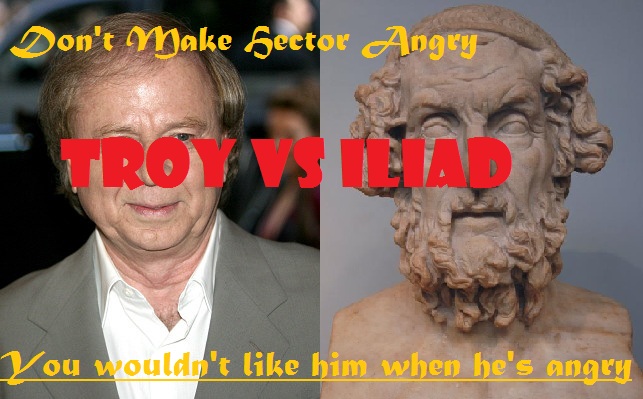Character Analysis
One of the main elements that unites the movie of Troy with the Iliad is the cast of characters. These characters have many things alike but there are also several differences. This blog post will explore these similarities and differences and explain what they reveal about the individual characters. I will look at the characters of Paris, Agamemnon, Hector and Achilles (Some minor characters may be examined in later posts).Paris
Paris is the character who in both the film and the poem initiates the war. In the Iliad, Paris (who is also known as Alexandrus) is the son of Priam and brother of Hector. He is known amongst the Trojan ranks as an arrogant coward. He spends little time on the field of battle and much time in the bedroom with Helen. The Trojans despise this fact that Paris hides behind his walls and his army doing his own will while for the last decade the Trojans have been dying for him. His chosen weapon is the bow (while he still has some basic knowledge of the sword and spear) which is considered a coward's weapon. Contrary to how the Trojans view Hector, "they all of them hated him as they did death itself".In Troy, Paris is a slightly more rounded and justified character. He still uses the bow more than the sword, and still abducts Helen but he is a little bit more honourable. He is played by Orlando Bloom, an actor who has a slight, but tough look. In Troy, Paris is not hated by the people and does not spend all his time away from the front line. Paris is still a slightly flat character in the film, his main role seems to be one of in love but cannot do anything about it. Rather than his behaviour in the Iliad of arrogance and an air of one who does not believe he can do anything wrong, Paris in the film expresses his discomfort with allowing Trojans to die for him many times.
In the Iliad, Book III, the Trojans send forth a champion (Paris) to fight for them. When Menelaus sees Paris he instantly jumps off his chariot, eager to fight the man who stole his wife. Paris then runs back into the Trojan army, terrified of fighting this great warrior. Hector chastises him and Paris agrees to fight Menelaus. There are a couple of things that are interesting about this passage. Firstly, Paris runs the from the fight he knows he cannot win, revealing a significant amount of self-importance (this is also shown when he runs away with Helen). Specifically, the book says: "Alexandrus quailed as he saw Menelaus come forward, and shrank in fear of his life under cover of his men." The other thing that is revealed is the amount of arrogance of the character. Hector says to him: "Paris...evil-hearted Paris, fair to see, but woman-mad, and false of tongue, would that you had never been born, or that you had died unwed. Better so, than live to be disgraced and looked askance at. Will not the Achaeans mock at us and say that we have sent one to champion us who is fair to see but who has neither wit nor courage? Did you not, such as you are, get your following together and sail beyond the seas? Did you not from your a far country carry off a lovely woman wedded among a people of warriors- to bring sorrow upon your father, your city, and your whole country, but joy to your enemies, and hang-dog shamefacedness to yourself? And now can you not dare face Menelaus and learn what manner of man he is whose wife you have stolen? Where indeed would be your lyre and your love-tricks, your comely locks and your fair favour, when you were lying in the dust before him?" To which Paris replies: "...taunt me not with the gifts that golden Venus has given me; they are precious; let not a man disdain them, for the gods give them where they are minded, and none can have them for the asking." This shows how 'full of himself' Paris is, swollen with self-importance.

